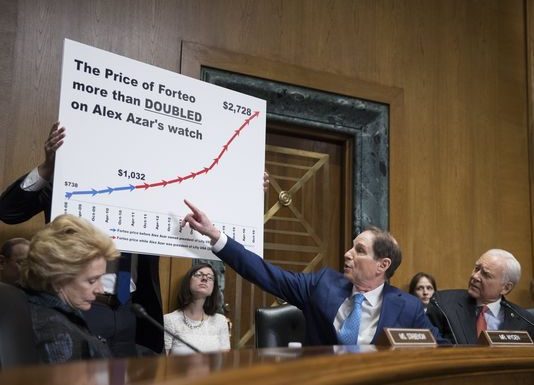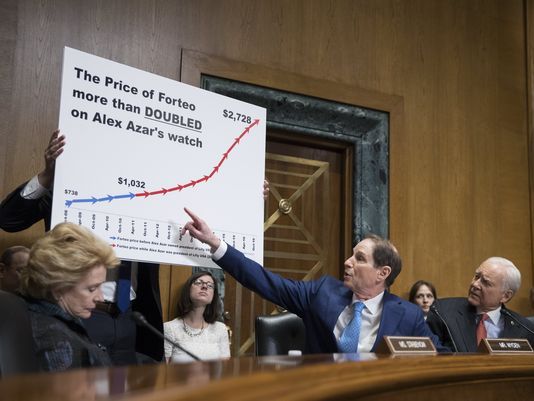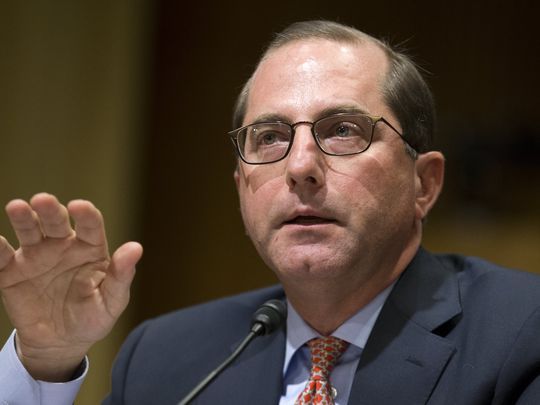
WASHINGTON — Senate Democrats on Tuesday confronted President Trump’s choice for Health and Human Services secretary — a former top executive at Eli Lilly and Co. — with the jump in price for Lilly’s pharmaceuticals under his tenure.
As aides held up red-arrowed charts at Alex Azar’s confirmation hearing, Sen. Ron Wyden, D-Ore., said the price of drugs used to treat diabetes, osteoporosis, heart disease and Attention Deficit Hyperactivity Disorder more than doubled when Azar was president of Lilly’s U.S.-based subsidiary.
“Did you ever lower the price — ever — of a Lilly drug?” asked Wyden, the Senate Finance Committee’s top Democrat.
“Drug prices are too high,” Azar responded. “I said that when I was at Lilly.”
When Wyden complained that Azar hadn’t answered his question, Azar blamed the system, saying every incentive is toward higher prices.
“No one company is going to fix that system,” Azar said. “That’s why I want to be here working with you.”
As he did at his first Senate hearing in November after being nominated, Azar promised to make tackling drug prices his top priority.
Trump has frequently attacked drug prices, including accusing pharmaceutical companies of “getting away with murder.”
Republicans argue Azar’s background — both his private sector experience at Lilly as well as his previous top positions at HHS during the George W. Bush administration — make him uniquely qualified to address the issue.
“I hope I can earn your trust and your confidence,” Azar said Tuesday.
But Democrats remained skeptical.
“You’ve indicated that you will hit the ground running. My question is: in what direction will you be running?” asked Sen. Debbie Stabenow, D-Mich., before pressing Azar on whether the $255 sticker price on a vial of the company’s fast-acting insulin Humalog is too much.
Azar agreed that the price is too high, but said that what’s “so bizarre” about the health care system is Lilly’s “net realized price” — what they collect for the drug — stayed flat even as the list price for Humalog went up. Patients who have insurance companies negotiating prices on their behalf may not be paying more, but others are, Azar acknowledged.
He called reversing the incentive for high list prices — even if that’s not the price most people pay — the most important nut to crack.
He also called for increasing competition among drug makers, stopping them from exploiting protections they get from competition under patent laws, and changing federal rules to allow drug companies to be reimbursed based on the effectiveness of their product.
“There’s not one action that all of a sudden fixes this,” he said. epa06427175 Alex Azar appears before the Senate Finance Committee hearing on his nomination to be Secretary of Health and Human Services (HHS), on Capitol Hill in Washington, DC, USA, 09 January 2018.
epa06427175 Alex Azar appears before the Senate Finance Committee hearing on his nomination to be Secretary of Health and Human Services (HHS), on Capitol Hill in Washington, DC, USA, 09 January 2018.
Azar rejected Sen. Claire McCaskill’s push to allow HHS to directly negotiate priceswith drug companies, which is prohibited by law. Azar said the private companies that administer Medicare’s drug benefit already do a good job negotiating costs. To a get a better deal, he said, the government would have to designate a list of drugs that would be covered, excluding other treatments seniors may want. He said that’s why some countries have lower drug prices than the United States does.
“I don’t believe we want to go there in restricting patient access,” he said.
Americans surveyed last year by the nonpartisan Kaiser Family Foundation named lowering prescription drug costs, along with lowering overall out-of-pocket health care costs, as the top health care priorities they want Trump and Congress to address. It’s also an issue that has rare bipartisan support among respondents.
Support for the Affordable Care Act continues to split along party lines, and Democrats pressed Azar on whether he would try to “sabotage” the Obama administration’s signature health policy achievement.
Azar said he would be obligated to make every program under his purview work “as well as possible.” But, “what we have is not working for everybody,” he added. Azar said he wants to give states more flexibility in running Obamacare programs, and give consumers more choice on what type of insurance they can buy.
“There’s not necessarily one right answer,” he said. “This is very complex.”
Pressed on whether he wants to cut Medicare and Medicaid, Azar said Medicare needs to be sustainable in the long term. But, he said, his energies would be focused
on making it run more efficiently and effectively, rather than on changes some have proposed including an increase in the eligibility age.
On Medicaid, Azar said the Trump administration’s previous proposal to slow the program’s rate of growth should not be considered a “cut.” He dismissed the notion as “Washington speak.”
Pressed by Sen. Sherrod Brown, D-Ohio, on whether HHS’s anticipated move to allow states to impose work requirements for “able-bodied” Medicaid recipients would hurt those suffering from mental illness or substance abuse disorder, Azar said he doesn’t have a definition of able-bodied. But throughout the hearing he expressed the importance of tackling the nation’s opioid epidemic.
“I’m a Hoosier so I’m right in the epicenter of the crisis in Indiana,” he said.
Azar would replace Trump’s first HHS secretary, Tom Price, who resigned in September after racking up large travel bills for chartered flights.
A vote on Azar’s nomination has not been set by Sen. Orrin Hatch, the committee’s chairman.
Calling Azar, “one of the best public servants that I’ve seen in the whole time that I’ve been here,” the Utah Republican said he wants to get Azar confirmed “as soon as we can.”
courtesy= usatoday.com

